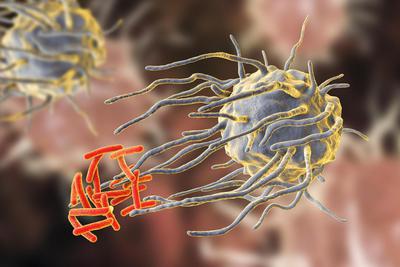Tuberculosis Outbreak in Kansas: A Wake-Up Call We Can’t Ignore
Think tuberculosis is a thing of the past? The recent outbreak in Kansas is a harsh reminder that it's far from gone. With one of the largest TB outbreaks the U.S. has seen in decades, it's time to ask: Why aren't we taking this more seriously? While many believe TB is under control, the disease is still claiming more lives worldwide than any other infectious disease. The Kansas outbreak should raise some red flags. Are we really as safe as we think, or is tuberculosis silently creeping back into our lives?
Listen to article

What's Happening in Kansas?
As of January 31, Kansas reported 67 cases of active TB, with two deaths. This makes it one of the largest TB outbreaks in the U.S. in the past 30 to 40 years. The numbers alone are enough to raise eyebrows, especially since we tend to think of TB as something that doesn't affect us here in the U.S. But the reality is that the disease is still spreading, and this outbreak is a warning to all of us.
Kansas isn't alone in this. The global impact of TB is much worse, with about 4,300 deaths per day from tuberculosis. TB is a serious, contagious disease that spreads through the air when someone with active TB coughs or sneezes. It can take hold quickly in close-contact environments, like schools, offices, and hospitals—places many of us spend our time.
The Bigger Picture: TB Worldwide
Here's the part that might really surprise you: Globally, TB is still one of the deadliest infectious diseases. In fact, it kills more people than any other infectious disease. In 2023, over 1.25 million people died from TB. And it's not just in far-off, developing countries. The disease thrives in places where healthcare access is limited or inadequate. Sadly, this is where most TB deaths occur, making it a global crisis.
The U.S. has done a lot to reduce TB rates, but that doesn't mean we're entirely free from the risk. As we saw in Kansas, TB can still spread, especially in vulnerable populations.
Tuberculosis in the U.S.
In the U.S., we're lucky to have one of the lowest rates of TB in the world. But that doesn't mean TB is gone or that we're immune to it. In fact, the Kansas outbreak is proof that we can't take our relatively low TB rates for granted. While TB is rarely fatal in the U.S. because of access to treatment, it can still be dangerous, especially for those with weakened immune systems or lung conditions, like COPD or emphysema. For these individuals, TB can be much more serious and harder to treat.
The truth is that TB is treatable, but it requires early detection and a commitment to completing the full course of antibiotics. If you don't follow the prescribed treatment regimen, there's a risk the bacteria could become resistant, which makes the disease much harder to control.
How Do Doctors Check for TB?
If you're wondering how doctors actually diagnose TB, it's not as simple as just getting an X-ray. X-rays are used as part of the process, but they don't confirm the disease. They can show lung abnormalities, like shadows or spots, which might suggest TB. But doctors need more tests, like like the TB/PPD Skin Test or QuantiFERON-TB Gold Blood Test, to really confirm TB.
An X-ray is just one step in the process. But it's still important, especially in cases like Kansas, where early detection is key to stopping the spread. If you've been in contact with someone who's had TB, it's worth getting an X-ray or other tests to be safe.
Is TB Really That Dangerous?
Yes, TB is dangerous, but the good news is that it's not typically fatal in the U.S. Thanks to modern medicine and easy access to antibiotics, TB is a curable and preventable disease here. However, if left untreated or if it's resistant to medications, TB can become much more serious. People with lung conditions or weakened immune systems are particularly vulnerable.
Globally, though, the situation is much more dire. TB is still one of the deadliest infectious diseases in the world, especially in places with poor healthcare access. In countries where people lack the resources for testing, diagnosis, and treatment, TB is a much bigger threat. That's why it's so important for the world to continue investing in public health systems and ensuring that everyone, no matter where they live, has access to the healthcare they need.
How Can You Protect Yourself?
Now that you're aware of the risks, what can you do to protect yourself from TB? First, if you live or work in an area that's seeing an outbreak (like Kansas), get tested. TB testing is a simple and quick way to make sure you're not at risk. If you've been in close contact with someone diagnosed with TB, it's even more important to get tested.
Second, if you do get diagnosed with TB, don't panic. TB is treatable with antibiotics, but it's essential that you complete the entire TB treatment regimen. Skipping doses or stopping the medication too soon can lead to drug-resistant TB, which is much harder to treat.
And finally, educate yourself and those around you about TB. Knowing the symptoms (persistent cough, weight loss, fatigue, night sweats) and getting tested early can save lives and help prevent the disease from spreading further.
TB Still Deserves Our Attention
It's easy to forget about TB when it's not front and center in the news, but the recent outbreak in Kansas shows us that the disease is far from being eradicated. While the U.S. may have a relatively low TB rate compared to other countries, we can't take it for granted. TB is still a global threat, and we must stay vigilant. The next time you hear about a TB outbreak, remember: It's not just happening somewhere else; it's a problem that could affect us all.
Frequently Asked Questions
What is tuberculosis (TB)?
If you're at risk, whether you've been in contact with someone diagnosed with TB or you live in an area with a known outbreak, get tested. Early detection is crucial for stopping TB from spreading.
Can an X-ray detect TB?
X-rays are used as part of the diagnostic process, but they can't confirm TB on their own. They can show abnormalities in the lungs, which could suggest TB, but additional tests like sputum analysis are needed to confirm the disease.
Is TB deadly?
TB can be deadly, but it's rarely fatal in the U.S. However, it can be dangerous for people with compromised immune systems or pre-existing lung conditions. Globally, TB is still one of the leading causes of death, particularly in areas with poor healthcare access.
What should I do if I’m at risk for TB?
If you're at risk, whether you've been in contact with someone diagnosed with TB or you live in an area with a known outbreak, get tested. Early detection is crucial for stopping TB from spreading.





